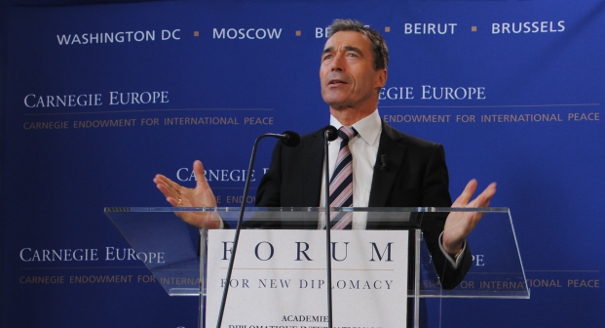Registration
You will receive an email confirming your registration.
In the latest session of the Forum for New Diplomacy, co-hosted by Carnegie Europe, the Académie Diplomatique Internationale, and the International Herald Tribune in Brussels, NATO Secretary General Anders Fogh Rasmussen joined Roger Cohen, columnist for the International Herald Tribune, to discuss how the Arab Spring affects NATO.
Heeding Calls for Democracy, Freedom, and Modernity
- Renewed Commitment: Faced with an unprecedented challenge at its borders, NATO is renewing its commitment to foster democracy, security, stability, and prosperity in the Arab world, Rasmussen said.
- A Call for Freedom: The alliance should not ignore the call for freedom and democracy, Rasmussen said.He stressed that it is not possible to safeguard peace and security within the Euro-Atlantic area when there are unresolved crises on its doorstep. It was this understanding that led NATO to act to avoid bloodshed in Libya, he added.
- Modernity: The wish for modernity, for an open exchange, and for the rule of law beyond despotism is one of the reasons for the upheavals in the Arab world today, Cohen added.
The Arab Spring
- A Stable Arab Region: A free, democratic, modern, and stable Arab region would benefit everyone, politically, economically, and culturally, Rasmussen said.
- Importance of Defense Budgets: Operations in Libya have also demonstrated the importance of not carrying out disproportionate cuts in defense spending among NATO’s European members, Rasmussen said. Such cuts would prevent NATO from launching international management operations in the future and would weaken the EU’s global influence.
- Libya and not Syria: Rasmussen explained that NATO was engaged in a mission in Libya under a specific mandate of the United Nations and with strong support from the region, particularly from the Arab League. Neither of these conditions is fulfilled with regard to Syria.
- Democracy in the Arab World: Democracy is about much more than majority rule, Rasmussen said. It must be interlinked with the values of human rights and the principle of rule of law. He stressed the importance of the international community in helping to promote democracy and fundamental rights.
Focus on Libya
- UN Resolution 1973: NATO is operating in Libya under Resolution 1973, adopted by the United Nations Security Council, which has effectively authorized all necessary measures to protect civilians, explained Rasmussen. To help end violence in the country, an international contact group has been established where politicians, including Rasmussen, can discuss how to promote a political solution to the conflict in Libya.
- NATO’s Mission in Libya: NATO and its partners have decided to extend the mission in Libya by an additional 90 days. Rasmussen stated that the international community must play a strong role in putting pressure on the regime and supporting the opposition for a peaceful transition to democracy. He described three clearly defined military objectives for the country:
- a complete end to all attacks against civilians,
- a withdrawal of Muammar Gaddafi’s forces to their bases and barracks, and
- the immediate and unhindered humanitarian access to people in need.
- a complete end to all attacks against civilians,
- NATO’s Role in Libya: While NATO will be ready to assist Libya in building democratic and accountable armed forces, Rasmussen emphasized that he did not see a significant role for the alliance in Libya after the current operation. Successful transitions to democracy can only occur from within countries, he continued. Instead, the international community—particularly the United Nations and the European Union—should do what they can to encourage an orderly and democratic transition in Libya.
- Solidarity Among Members: The current operation in Libya has illustrated the solidarity between alliance members, Rasmussen asserted. The United States has often played a prominent role in NATO operations, sometimes giving the impression that other members are less involved. In Libya, however, European countries and Canada, with the assistance of other partners, have taken the lead in operations.
NATO Moving Beyond Existing Partnerships
NATO is ready to enhance dialogue on security cooperation with countries in the Arab world, Rasmussen said. He stressed that NATO is prepared to engage with partners across and beyond the existing partnership frameworks, such as the Mediterranean Dialogue and the Istanbul Cooperation Initiative. While Libya is not currently a partner, NATO would welcome a democratic Libya, either within the framework of the Mediterranean Dialogue or as a bilateral partner.
